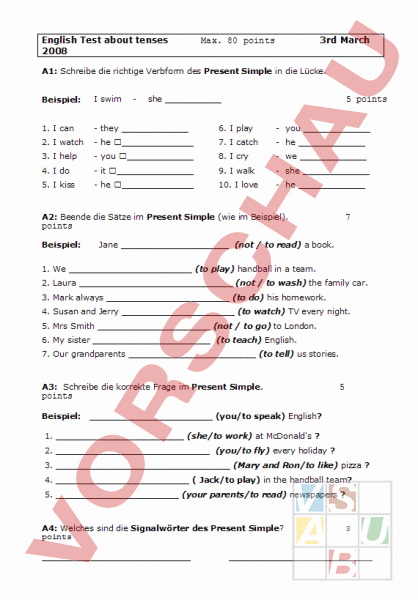Arbeitsblatt: test about tenses
Material-Details
present simple
present continuous
going-to-future
Englisch
Grammatik
8. Schuljahr
4 Seiten
Statistik
17000
943
49
12.03.2008
Autor/in
Sara Gattiker
Land: Schweiz
Registriert vor 2006
Textauszüge aus dem Inhalt:
English Test about tenses 2008 3rd March Max. 80 points A1: Schreibe die richtige Verbform des Present Simple in die Lücke. Beispiel: swim she 1. can they 6. play you 2. watch he 7. catch he 3. help you 8. cry we 4. do it 9. walk she 5. kiss he 10. love he 5 points A2: Beende die Sätze im Present Simple (wie im Beispiel). 7 points Beispiel: Jane (not to read) book. 1. We (to play) handball in team. 2. Laura (not to wash) the family car. 3. Mark always (to do) his homework. 4. Susan and Jerry (to watch) TV every night. 5. Mrs Smith (not to go) to London. 6. My sister (to teach) English. 7. Our grandparents (to tell) us stories. A3: Schreibe die korrekte Frage im Present Simple. 5 points Beispiel: (you/to speak) English? 1. (she/to work) at McDonald 2. (you/to fly) every holiday 3. (Mary and Ron/to like) pizza 4. Jack/to play) in the handball team? 5. (your parents/to read) newspapers A4: Welches sind die Signalwörter des Present Simple? points 3 B1: Setze die in Klammern stehenden Verbformen ins Present Continuous. Beispiel: We (to go) now. 1. John and Mandy (to clean) 2. (to read) 6 points the kitchen. book at the moment. 3. It (to rain) now. 4. We (to sing) new song. 5. The children (to watch) TV. 6. Our friend (to pack) his rucksack. B2: Schreibe die Verneinung im Present Contiuous. 6 points Beispiel: They (not/to play) baseball. 1. We (not/to buy) new house. 2. Jane (not/to read) book. 3. Peter (not/to watch) TV. 4. Max and Sue (not/to help) their father. 5. (not/to talk) to John. B3: Schreibe korrekte Fragen im Present Continuous. Achte darauf, dass du die vorgegebene Personenform benutzt!! Beispiel: to music? (you/to listen) points 1. in the lake? (Lisa/to swim) 2. your brother? (you/to help) 3. museum? (he/to visit) 4. home? (they/to run) 5. breakfast? (we/to make) 6. the newspaper? (he/to read) 6 B4: Welches sind die Signalwörter des Present Continuous? 2 points C1: Setze die Verben im going-to-future in die Lücken ein. 7 points Beispiel: We an icecream. (not/to buy) 1. Mary pizza. (not/to eat) 2. you to London? (to fly) 3. What they tomorrow? (to do) 4. She her boyfriend tonight. (not/to see) 5. you the next bus? (to take) 6. We volleyball now. (not/to play) 7. When he her? (to kiss) C2: Schreibe deine Pläne für das nächste Wochenende auf. Schreibe zwei Sätze positiv (also was du machen wirst) und zwei Sätze verneint (also was du nicht machen wirst). Beispiel: 4 points 1. 2. 3. 4. D1: In welcher Zeitform stehen die folgenden Sätze? 9 points Schreibe die entsprechende Abkürzung hin: P.S. für Simple Present, P.C. für Present Continuous, oder G.F. für Going-to-Future. Beispiel: My mother is cooking dinner now. a) am not going to give you my phone number. b) He is playing with his sister at the moment. c) We usually have breakfast at 8 oclock. d) Is it snowing in Switzerland? e) Do the children like pizza? f) He isnt listening to the teacher at the moment. g) Are you going to be football star when you are 18? h) My parents dont go out very often. i) Look! Our teacher is wearing new trainers. D2: Schreibe das fettgedruckte Verb in der richtigen Zeitform in die Lücke. Benutze das Present Simple, das Present Continuous oder das Goingto-Future. Achte auf die Signalwörter! Beispiel: Fish (to swim) in the water. 20 points 1. Andy sometimes (to read) comic. 2. (to phone) my friend after school. 3. Listen! Sandy (to sing) Umbrella from Rihanna. 4. My brother usually (to help) in the kitchen. 5. We (to see) film next weekend. 6. (to write) an English tests now. 7. Cats (to eat) mice (Mäuse). 8. They often (to clean) the bathroom. 9. My grandfather (to go) for walk every day. 10. Listen! The band (to play) the new song. 11. John (to play) football at the moment. 12. Look! Ben and Luke (to watch) TV. 13. Every morning my mother (to get up) at 6 oclock. 14. You (to do) your homework after school. 15. Steve always (to ride) his bike in the afternoon. 16. The sun (to shine) now. 17. They (to fly) to London next summer. 18. We sometimes (to read) books at school. 19. He never (to watch) video in the morning. 20. My mother (to make) breakfast now. good luck good luck good luck good luck Students name: Points: . 80 Parents signature: Mark:
